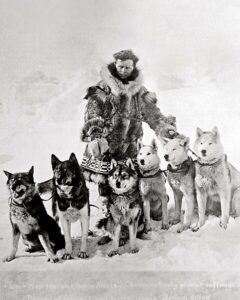Leonhard Seppala
Edit ArticleLeonhard Seppala
Leonhard "Sepp" Seppala (September 14, 1877 – January 28, 1967) was a Norwegian-Finnish-American sled dog breeder, trainer and musher who left an indelible mark on sled dog racing. Hailing from Lyngen, Troms og Finnmark, Northern Norway, Seppala's journey began in 1900 when he immigrated to Alaska during the Nome gold rush, later becoming a naturalized citizen in 1906. Unexpectedly thrust into sled dog racing in 1913, Seppala inherited a team of Siberian sled dogs, leading to victories in the All Alaska Sweepstakes from 1915 to 1917.
Seppala's most heroic moment unfolded during the 1925 serum run, famously known as the "Great Race of Mercy." Faced with a diphtheria outbreak in Nome, Seppala courageously crossed treacherous terrain, including Norton Sound, to deliver life-saving serum. Braving gale-force winds and severe blizzards, Seppala and his lead dog, Togo, covered 260 miles in 4.5 days, an effort commemorated by the Iditarod Trail Sled Dog Race. Beyond his racing prowess, Seppala played a crucial role in popularizing the Siberian Husky breed in the United States and Canada.
The enduring legacy of Seppala is acknowledged through the Leonhard Seppala Humanitarian Award by Alaska Airlines, the street named Seppala Drive in Nome, and the 2019 Disney movie "Togo," where Willem Dafoe portrays Seppala.
